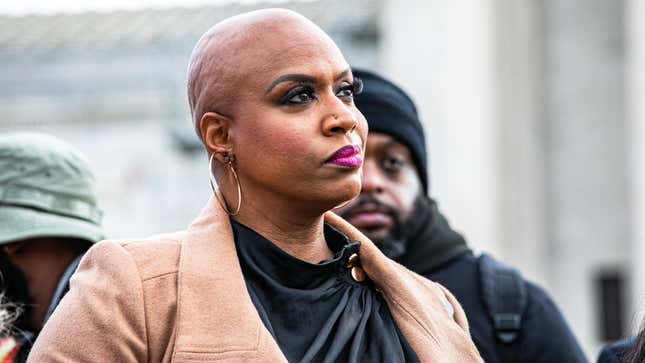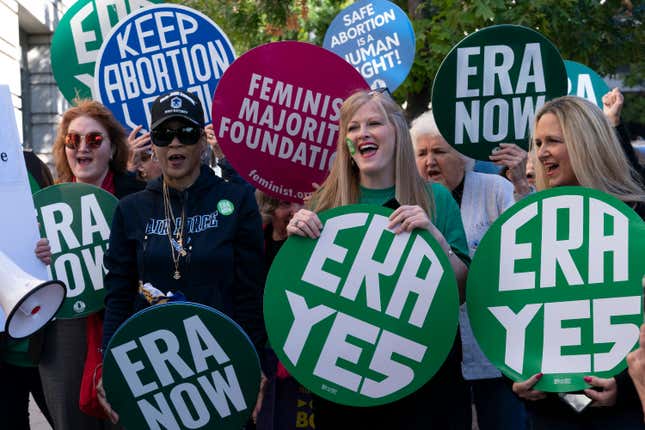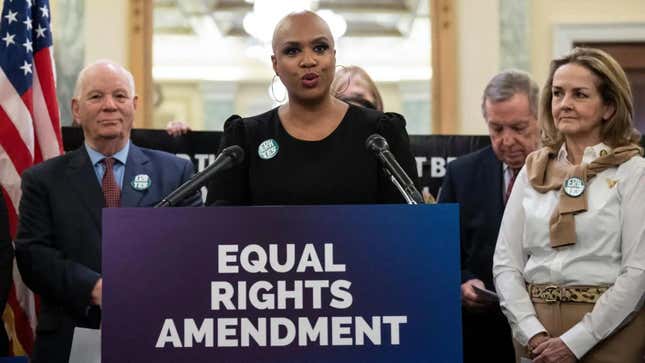The ERA Could Expand Abortion Rights
“We need to use every tool at our disposal to protect and expand abortion access—one tool is the ERA,” Rep. Ayanna Pressley told Jezebel.
Politics

It’s been a century since the Equal Rights Amendment was first introduced in Congress and over 50 years since it passed. The bill then floundered for years, ultimately blowing past its seven-year deadline to be ratified in at least 38 state legislatures. But there’s new potential—and heightened necessity—for the ERA in a post-Roe v. Wade nation.
The proposed amendment isn’t just symbolic. “We need to use every tool at our disposal to protect and expand abortion access—one tool is the ERA,” Rep. Ayanna Pressley (D-MA), co-author of a new resolution to affirm the ratification of the ERA, told Jezebel. Pressley emphasized “it’s about outcomes,” meaning if passed, it could give two other bills she’s co-authored—one to codify the federal right to abortion (the Women’s Health Protection Act) and one to allow federal funding for abortion (the EACH Act)—a stronger chance at passing.
The ERA faces an uncertain path forward and an array of legal barriers. While its ratification is a big “if,” to Pressley’s point, there’s some precedent for the amendment’s powers to advance reproductive rights: In 1998, advocates in New Mexico successfully sued for the state to offer public funding for abortion, citing the state’s ratification of the ERA. An appeals court ruled in their favor, stating that the abortion funding ban “does not apply the same standard of medical necessity to both men and women.” The Pennsylvania Supreme Court is currently considering a similar case on Medicaid coverage of abortion, also weighing the state’s ratification of the ERA. Last summer, a Utah judge temporarily blocked the state’s abortion ban from taking effect to hear arguments from Planned Parenthood, which argues that the ban violates Utah’s ratified ERA.
The New Mexico ruling—and Pressley’s resolution—offer rare hope as abortion bans across the country subject women and pregnant people to distinctly gendered agony and medical discrimination. As one Texas woman put it this week, recounting her near-death experience as a result of her state’s ban: “Where else in medicine do we wait and see how sick a patient becomes before acting?”
Where the ERA stands

The ERA failed to pass in enough state legislatures following aggressive, 1960s fearmongering from conservative women that equality would harm women. Decades later, amid the emergence of MeToo, the amendment gained renewed traction through celebrity activism. But even when Virginia became the 38th state to ratify the ERA in 2020, nothing happened—the states had missed the ratification deadline specified in the original ERA bill by nearly 50 years.
-

-

-

-

-

-

-

-

-

-

-

-

-

-

-

-

-

-

-

-

-

-

-

-

-

-

-

-

-

-

-

-

-

-

-

-

-

-

-

-









































